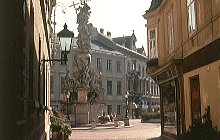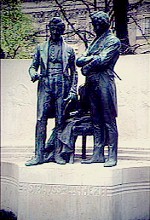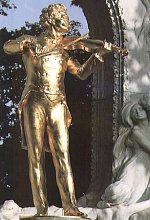| [naar
inhoudsoverzicht Strauss-dynastie]
[naar
literatuurlijst]
|
 |
Strauss memorial
places |
|
Baden
|
Badgastein
|
Bad Ischl
|
Vienna
|
| Vienna 1., Dorotheergasse 18 |
Vienna 4., Johann-Strauß-Gasse 10-14 |
Vienna 1., Kumpfgasse 11 /
Riemergasse 14 |
Vienna 7., Kaiserstraße 12-14 |
| Vienna 1., Rathaus (city hall) |
Vienna 7., Mechitaristengasse 5 |
Vienna 1., Rathauspark,
parliaments side |
Vienna 7., Lerchenfelderstraße 15 |
| Vienna 1., Reichsratstraße 9 |
Vienna 11., Simmeringer Hauptstraße 234 |
| Vienna 1., Stadtpark |
Vienna 13., Maxingstraße 18 |
| Vienna 2., Floßgasse 7 |
Vienna 16., Neulerchenfelder Straße 14 |
Vienna 2., Obere Donaustraße 95
(= Lilienbrunngasse 1) |
Vienna 19., Billrothstraße. Strauß-Lanner-Park |
| Vienna 2., Praterstraße 54 |
Vienna 19., Döblinger Hauptstraße 76 |
| Vienna 4., Johann-Strauß-Gasse 4 |
Vienna 19., Dreimarksteingasse 13 |
Baden
| Lower Austria. City. First mention in a document in 869. Through the
thermal springs and the summer sojourns (1811-1834) of Franz I, development
into the health resort of the Biedermeier period, where several artists
(Wolfgang Amadeus Mozart, Ludwig van Beethoven, Franz Schubert, Johann
Strauss, Father, Franz Grillparzer, Ferdinand Raimund) sojourned. |

Baden, Hauptplatz |
Sights:

Strauß-Lanner-monument |
Strauss- Lanner monument in the Kurpark (erected in 1912)
Commemorative tablet on the front of the former tavern "Schwarzer
Adler"
(Rathausgasse) in memory of Johann Strauss and Franz Schubert
Municipal parish church St. Stephan (1477)
Former Augustinian hermits' cloister (13th century)
Beethoven house (Beethoven days)
Ruin of Rauhenstein and Rauheneck (12th century), in the outskirts |
Badgastein
Salzburg. Municipality. Health and winter resort in the valley of the Gasteiner
Ache, at the foot of the Graukogel (2492 m).
Sights:
Museum of Gastein referring to Johann Strauss
Waterfall of the Gasteiner Ache in the center of the town
Cable railway to the Stubnerkogel (2246 m)
Parish church (1866-1876)
Gothic church of St. Nikolaus (1389) with late Gothic frescos
House Meran (villa of archduke Johann, 1830)
Gasteiner Museum
Haus Austria
A - 5640 Bad Gastein
Phone: 43-6434-3488
Bad Ischl
Upper Austria, city (1940), health resort in the heart of the Salzkammergut
on the emptying of the Ischl into the Traun.
1854-1914 summer holidays of Emperor Franz Joseph I and the composers
Johannes Brahms (1833-1897), Johann Strauss, Son (1825-1899), Anton Bruckner
(1824-1896), Emerich Kálmán (1882-1953) and Franz Lehár
(1870-1948).
Sights:
Vienna
Wien 1., Dorotheergasse 18
The confirmation of Johann Strauss' body took place at the Protestant church
A.B..
Vienna 1., Kumpfgasse 11 / Riemergasse 14
Commemorative tablet (1949). Johann Strauss (father) lived here with his
mate Emilie Trampusch from 1848 till death. Among others, he composed the
"Radetzkymarsch" here.
Wien 1., Rathaus (city hall)
Johann Strauss bust by Viktor Tilgner at the upper end of the Feststiege
I
Wien 1., Rathauspark, parliament's side
Strauss-Lanner monument by Robert Oerly and Franz Seifert on the south
side of the Rathauspark. Lanner is shown with violin and bow, Johann Strauss
is holding a music notebook.
Vienna 1., Reichsratstraße 9
Eduard Strauss died in this house on December 28th 1916.
Vienna 1., Stadtpark
Johann Strauss monument (1921) by Edmund Hellmer (1850-1935).
Vienna 2., Floßgasse 7
Commemorative tablet (1883). Here, Franz Strauss pursued his beer tavern
between 1803 and 1816 and Johann Strauss, Father was born on March 14th
1804. In 1906, the house was pulled down and replaced by a new building. |

Johann Strauss monuement |
Vienna 2., Obere Donaustraße 95 (= Lilienbrunngasse 1)
Commemorative tablet on the site of the former "Altes Dianabad". In 1867,
the waltz "An der schönen blauen Donau" was performed here for the
first time in 1867.
Vienna 2., Praterstraße 54
Johann Strauss' dwelling house (1867-1878) with commemorative tablet of
the Viennese Schubertbund (1925). Among others, the waltz "An der schönen
blauen Donau" was composed here.
Johann-Strauß-Gedenkstätte
Praterstraße 54
A - 1020 Vienna
Phone: 43-1-2140121
Vienna 4., Johann-Strauß-Gasse 4 (formerly Igelgasse)
At this place was the Strauss palace, built in 1876-78, where Johann Strauss
lived from 1878 till death. The building was destroyed by bombs in 1944.
Commemorative tablet from 1967.
Vienna 4., Johann-Strauß-Gasse 10-14
Mosaic with the first few bars of the waltz "An der schönen blauen
Donau" on the front.
Vienna 7., Kaiserstraße 12-14
Josef-Strauß-Park. Commemorative tablet on the right side of the
entrance.
Vienna 7., Mechitaristengasse 5
At this place was the house where Joseph Lanner was born (commemorative
tablet).
About 1910, the writer Ludwig Wegmann is said to have opened here a
commemorative room of Lanner. It does not exist anymore today.
Vienna 7., Lerchenfelder Straße 15
About 1910, the writer Ludwig Wegmann is said to have opened here a commemorative
room of Lanner. It does not exist anymore today.
Vienna 11., Simmeringer Hauptstraße 234 (Zentralfriedhof - central
cemetery)
Tomb of honor of Joseph Lanner (Gruppe 32A, No. 16). Initially, the tomb
was at the old cemetery of Döbling (today 19., Strauss-Lanner-Park)
close to Johann Strauss' tomb. In 1903, the body was transferred to the
Zentralfriedhof.
Vienna 11., Simmeringer Hauptstraße 234 (Zentralfriedhof - central
cemetery)
Tomb of honor of Eduard Strauss (gruppe 32A, No. 42). Monument by Eduard
Hauser (1840-1915). Eduard Strauss was buried in the uniform of the Hofballmusikdirektor
(court ball music director).
Vienna 11., Simmeringer Hauptstraße 234 (Zentralfriedhof - central
cemetery)
Tomb of honor of Johann Strauss, Father (Gruppe 32A, No. 15). Initially,
the tomb was at the old cemetery of Döbling (today Wien 19., Strauß-Lanner-Park)
close to Joseph Lanner's tomb. In 1903, the body was transferred to the
Zentralfriedhof.
Vienna 11., Simmeringer Hauptstraße 234 (Zentralfriedhof - central
cemetery)
Tomb of honor of Johann Strauss, Son (Gruppe 32A, No. 27). Monument by
Johannes Benk (1844-1914).
Vienna 11., Simmeringer Hauptstraße 234 (Zentralfriedhof - central
cemetery)
Tomb of honor of Josef Strauss (Gruppe 32A, No. 44).
Wien 13., Maxingstraße 18
Johann Strauss' dwelling house (1862-1867), from 1868 on in his possession.
Among others, the operetta "Die Fledermaus" was composed here (commemorative
tablet).
Vienna 16., Neulerchenfelder Straße 14
Here was the tavern "Zur blauen Flasche", where Johann Strauss performed
his "Ligourianer-Seufzer-Polka" in 1848. Commemorative tablet with wrong
date of birth.
Vienna 19., Billrothstraße. Strauß-Lanner-Park
Here was the old Döblinger Friedhof (cemetery of Döbling), where
Johann Strauss, Father and Josepf Lanner were interred. In 1903, they received
tombs of honor at the Zentralfriedhof. The Döblinger Friedhof was
closed in 1927. A pyramid of stone with an epigraph from 1844 suggests
the former tomb.
Vienna 19., Döblinger Hauptstraße 76
The "Casino Zögernitz" was at this place (commemorative tablet).
Vienna 19., Dreimarksteingasse 13
In 1829-1836, summer holidays of the Strauss family. Here the six-year-old
Johann Strauss is supposed to have composed his first waltz (commemorative
tablet).
|